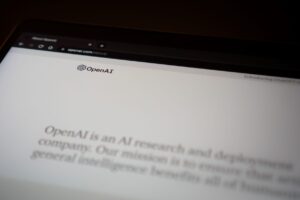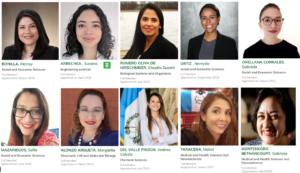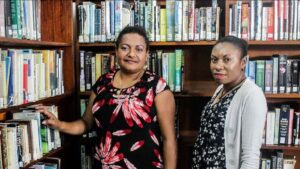Training supports libraries to monitor use of e-resources
Veronika Schaeffler discusses the importance for research and development of monitoring and evaluation of e-resources for library consortia and reflects on a recent workshop in Sri Lanka
Through my work at INASP I have learned that a wider availability of digital material constitutes a huge step forward in enabling the work of researchers, lecturers and decision makers in developing countries. Libraries that INASP work with in Asia, Africa and Latin America have access to up to 50,000 online journals and 20,000 e-books through our access and availability programme. They also have over 45,000 titles via Research4Life and other schemes. But availability is not enough, as there are diverse challenges for researchers and other users to access the resources. Librarians must be responsible for offering easy access to publications, and they must have means to assess accessibility.
Informed decision and policy making relies on access to knowledge and research, which starts in the academic library. Anne Powell from INASP points out in her guest blog on the Scholarly Kitchen “it seems that health workers, Ministry of Health officials and researchers in Liberia had no knowledge of studies suggesting that Liberia could be considered an endemic zone for Ebola.…In fact, these studies should have been easily available to Liberian researchers and health workers through Research4Life, had they only known that they were there, or indeed, registered to access the programme.”
One of the most important, but also challenging, roles of librarians today is to support academic staff and students in trusting and using new technologies and in making the right choices from the growing number of available research publications. Mashroofa Mohamed Majeed, Senior Assistant Librarian at the South Eastern University of Sri Lanka and workshop participant, says, “Libraries in the developing world should give digital information to their users […] they are the ‘Net Generation’, we have to fulfill their information needs in the way they want.”
In addition to barriers to access such as complicated platforms, issues with bandwidth, and a failure to adapt to new technologies, budgetary constraints also often act against the librarian in support of academia. The consortium may only be able to afford and provide a selection of resources and it is important that libraries and consortia are able to analyse and assess which resources are the most valuable for their users.
Whatever sector you work in, you want to understand the value of what you are paying for, and it’s no different for universities in the South. Universities and research institutes in the South have limited budgets along with big challenges to address such as upgrading facilities, accommodating new students and training staff. So when it comes to online journals and books, they need to know what their researchers need, what they use, and what value they are getting from what they buy. How do you know if you’re buying the right things if you don’t look at your usage data?
Training to evaluate
In May 2015 I travelled to Sri Lanka to observe and co-facilitate a workshop hosted at the University of Colombo by the SCOLIS (Standing Committee on Libraries and Information Sciences) library consortium. The event was part of the series of Monitoring and Evaluation of E-Resources Use (MEERU) workshops for librarians who are members of a national library consortium.
The workshop, which was facilitated by experienced Sri Lankan university librarians, included 24 librarians from around the country.
It was designed to provide participants with the skills to collect usage data from their institution to inform the consortium in the selection and renewal of online resource subscriptions. They also learned how to use the data collected, which will feed into and help guide consortium-level decision making. This can have a positive impact on value for money when consortia are negotiating and making decisions on subscription renewals.
The three-day event helped librarians in Sri Lanka to gain the skills and knowledge for monitoring the usage of electronic resources as well as providing the opportunity of strengthening the relationships between consortium members in order to share experience and give mutual support.
At the end of the MEERU workshop, all participants agreed their own action plans. These include the preparation of regular usage reports to share with the consortium as well as the participation in a Monitoring & Evaluation working group to address challenges. The strengthening of usage monitoring and relevant skills will help universities to make better decisions on which resources to subscribe to in the future. Libraries will also gain knowledge about which resources need promotion in awareness campaigns.
The participants learnt new methods and shared their experiences on how to access usage data. The collaborative environment meant that they were able to offer advice to institutions which have had problems with receiving the required statistics in time. They now know what to expect from each publisher and how to either obtain the statistics directly or request them from publishers. The newly founded working group will endeavor to build better relationships with the publishers in order to resolve issues in access to usage reports and help to share experiences and information, narrowing the differences in skills levels and knowledge among the librarians. They will be able to share workshop materials and learning with those colleagues not represented at the workshop.
Please visit INASP’s webpage for workshop material – http://www.inasp.info/en/training-resources/courses
INASP’s work in Sri Lanka
INASP has been working with academic and research libraries in Sri Lanka since 2003, through access to information resources and training of librarians.
INASP’s approach is work with our partners to hand over INASP’s role to national bodies. In 2013, the Standing Committee on Libraries and Information Sciences (SCOLIS) was founded as the consortium of Sri Lankan university libraries. Over 60 libraries, university departments and other institutions in Sri Lanka have joined the consortium since then and have access to diverse electronic resource collections. It has been a big story of success; the consortium can currently offer access to over 3000 titles compared to the approximately 100 titles that were available for some institutions before INASP started to work in the country.
INASP also provides support to local journals – and training for their editors – through the Sri Lanka Journals Online (SLJOL) platform, which INASP established in 2008 and which is now being managed by the National Science Foundation of Sri Lanka. The SLJOL platform hosts 60 Sri Lankan journals.
INASP’s AuthorAID project supports researchers in the country through its mentorship scheme, online resource library and research writing courses. AuthorAID’s research writing course is now embedded in postgraduate training at the University of Colombo’s medical school and as part of the Sri Lanka Medical Association’s continuing professional development programme.
For more information on INASP’s work in Sri Lanka, see our country factsheet.





INASP should offer low cost price of e-resources for developing country like Bangladesh. Last year, we have no opportunity to use IEEE journals for increasing their cost. I am requesting the authority of INASP on behalf of the users of Bangladesh, reduce their cost so that our users can use their required journals and meet the need of information.
Publishers, for example, IEEE can make the decision to offer their priced collections to consortia through INASP or directly. Several years ago IEEE opted to work directly, so are no longer offering their collections through INASP. INASP has been preparing consortia to take on their own licensing and negotiations, and I co-facilitated a workshop for the SE Asia consortia in Bangladesh in March this year, at which the consortia representatives for Bangladesh shared their experience and expertise in this rea. I know there are on-going discussions between most of the consortia working with INASP, speaking with one voice, and IEEE.
From the publisher side, INASP has developed a set of principles which publishers wishing to develop and maintain their business in developing countries in a responsible and sustainable manner, will follow. Again, though, it is their choice.
INASP has been supporting us to grant access to many scholarly databases since 2006 on wards. This really enriches teaching, learning and research activities of all higher educational institutions of Sri Lanka. Though renewal of some of the resources were discontinued due to financial constraints, still we are offered good quality databases. Thanks INASP and special thanks to Ms. Anne Powel who administers this venture.
In addition to resource support INASP supported to educate the librarians, especially they conducted many workshops and training programs on e-resources and Information Literacy in Sri Lanka. The last workshop, posted by Ms. Veronika here is also very useful. learns from this workshop to monitor usage statistics, interpret data, and evaluate qualitatively the perceptions of users. Through monitoring and evaluation strategies we are now able to monitor the usage of each resources and based on the statistics we can able to organize some marketing programmes, awareness seminars and hands on training to enhance usage.I will practically apply the experiences I gained through this and hope to do a survey very shortly and publish it.
Thanks Ms. Veronika and other resource persons.
A big thanks to INASP.